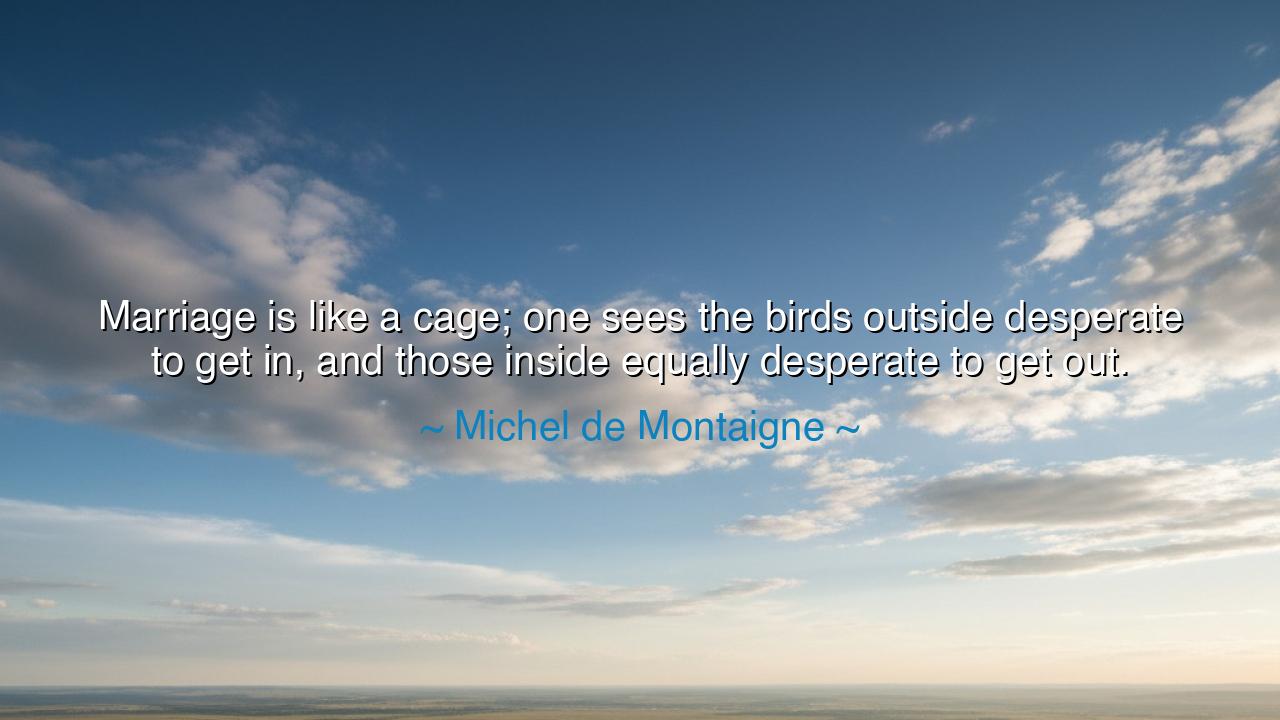
Marriage is like a cage; one sees the birds outside desperate to
Marriage is like a cage; one sees the birds outside desperate to get in, and those inside equally desperate to get out.






“Marriage is like a cage; one sees the birds outside desperate to get in, and those inside equally desperate to get out.” These words, spoken by the French philosopher Michel de Montaigne, shine with the wit of observation and the melancholy of truth. Written in the sixteenth century, they still echo through the centuries, capturing the eternal paradox of human longing. In this single image — the cage of marriage and the birds that circle it — Montaigne reveals the dual nature of love and freedom, desire and confinement. His wisdom does not mock marriage, but rather exposes the restless heart of man: ever yearning for what he does not have, ever weary of what he has gained.
When Montaigne likened marriage to a cage, he spoke from both experience and reflection. In his essays, he often pondered the nature of human contentment and the contradictions within it. Marriage, to him, was a sacred bond, yet one fraught with expectation, duty, and the slow erosion of passion. Those outside the cage, the unmarried, gaze upon the union of two souls and imagine happiness — companionship, love, the end of loneliness. Yet those within, bound by routine and responsibility, remember the open skies of freedom and yearn for flight once more. Thus, Montaigne captures not the failure of marriage, but the irony of the human heart — that we always seek fulfillment in the very thing we once fled.
The origin of this insight lies in Montaigne’s own life. Married young to Françoise de La Chassaigne, he approached the institution more as a civic duty than a romantic adventure. Yet his writings show tenderness and gratitude toward her, even as he admitted that marriage was seldom a sanctuary for passion. “Marriage,” he wrote, “hath need of other helps and props, to maintain itself, than those of love.” His quote about the cage arises from this sober understanding — that while marriage offers stability, it may also confine the wildness of spirit that once drew lovers together. It is both a blessing and a burden, a home and a prison, depending on the wisdom of those who inhabit it.
In this, Montaigne reflects a truth that every age must rediscover. The ancients, too, saw this tension between freedom and commitment. The Greek philosopher Socrates, when asked whether a man should marry, replied, “Whichever you do, you will repent it.” His words, like Montaigne’s, were not bitterness but balance — a recognition that love, though divine, demands sacrifice. Even the noblest marriages, such as that of Marcus Aurelius and Faustina, carried both devotion and difficulty. The emperor, philosopher though he was, knew that human bonds are forged in imperfection, and that happiness is not constant even within love’s embrace.
To see marriage as a cage, then, is not to condemn it, but to understand it. The cage is not cruel by nature — it is built from vows, expectations, and shared life. It becomes confining only when one forgets that love must breathe as well as bind. Many enter marriage believing it will grant them eternal bliss, yet find that it requires more endurance than ecstasy. Many within long for the thrill of the chase, forgetting that freedom without devotion is but loneliness in disguise. Thus, Montaigne reminds us that the struggle of marriage is not with one’s partner, but with oneself — with the restless mind that craves both security and adventure.
Consider the story of Simone de Beauvoir and Jean-Paul Sartre, centuries after Montaigne’s time. They chose a love outside convention, refusing marriage’s “cage,” yet even they wrestled with the same longing and discontent that Montaigne described. They were free, yet bound by jealousy; independent, yet tethered by affection. Their lives prove that whether one lives within or beyond the cage, the heart remains the same — wild, yearning, and never fully at peace. It is not the cage that imprisons us, but our inability to find contentment wherever we stand.
So let this be the lesson of Montaigne’s wisdom: do not curse the cage, nor envy those beyond it. The measure of a soul is not whether it is married or free, but whether it is at peace with its own choice. If you marry, do so not to possess, but to serve love through patience and renewal. If you remain free, do so not in fear of confinement, but in reverence for solitude. The cage can be a place of song or silence, depending on the heart that dwells within. For freedom without love is emptiness, and love without freedom is suffocation. The wise learn, as Montaigne did, that happiness is not found in escaping the cage, but in making it a home for the soul to rest and still dream of the sky.






AAdministratorAdministrator
Welcome, honored guests. Please leave a comment, we will respond soon